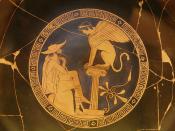Aristotle defined Oedipus Rex, written by Sophocles as the perfect tragedy. One of the elements in his definition of tragedy included tragic flaw (hamartia), and he said a tragic hero's downfall should be due to his/her tragic flaw. King Oedipus falls from a high status from being a powerful noble king in to a low status by blinding himself and committing a moral sin of killing his father, marrying his mother, and producing an offspring with incest due to his tragic flaws--hubris, rage and short temperedness. In this passage, Oedipus's hubris is demonstrated by one of the literary devices, caesura, which is used in Oedipus's speech to emphasize Oedipus's use of language to reflect his feelings of superiority/hubris. In addition, Sophocles structured his passage without obvious rhythm and rhymes and with the contribution of his clever uses of diction that contains cacophony support the idea of Oedipus's other flaw--rage.
Oedipus speaks the following passage after Teiresias reveals that Oedipus is responsible for the mysterious death of King Laios and the suffering in Thebes, "What good were they? Or the gods, for the matter of that? / But I came by, / Oedipus, the simple man, who knows nothing--/I thought it out for myself, no birds helped me!/ And this is the man you think you can destroy"(Sophocles 21).
Sophocles used caesura to give us a clue about Oedipus's hubris. For example, Sophocles used after "I thought it out for myself,"(Sophocles 21) to emphasize "myself", to impact his mood by emphasizing how Oedipus is proud about his own greatness and accomplishments. In addition, Sophocles used caesura to show how Oedipus thinks he is superior to the gods and Teiresias by emphasizing "but I came by,"(Sophocles 21). This allows him to shift his mood from how helpless the city was until he...


